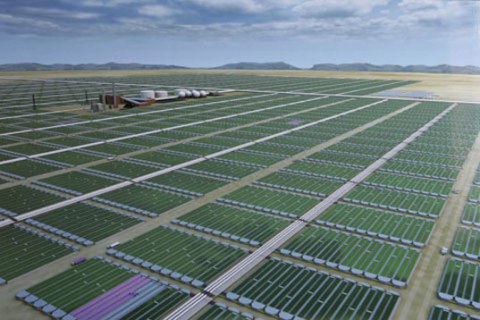Australian Algae Biomass Association:
Australian Algae Biomass Association seeks to promote the use algae as a biofuel in Australia. Their is a number of projects which are being worked on in confidentiality with partners like AUSI, Australien Universal Space Industries & these involve new types of technology in algae production for the Australian & Asian markets.
Algae requires nutrients, sunlight & water to grow, algae thrive on saline, brackish and waste waters. Their have been proposals made where wastewater, human waste, animal waste & plant waste, along with C02 emissions from industrial process's can all be used as the nutrients in algaculture. In regards to the monoculture production of algae, wastewater, human waste, animal waste & plant waste, along with C02 emissions from industrial process's, would have to be piped to algaculture farms. After oil is extracted from the algae, the algae residue is then used as a animal feedstock & soil fertiliser.
In the 1970's algae based biofuels were found to be the most efficient biofuel, producing more oil than any other crop. Current international Biofuel outlines are stuck in 1930's research & findings.
Contact: Australian Algae Biomass Association
email: mantra@spraci.zzn.com
Countries around the world are setting renewable energy targets & part of this renewable energy target involves biofuel production. Currently only 10% biofuel targets have been set in most countries, some countries like Europe, the United States & South America have set 20% biofuel target's hopefully with other countries following suit. Even if the world invests in algae based biofuel we will still only see 20% targets being reached or possibly 30% biofuel targets being reached at our current level of technology.
What this means is that we will have to eventually see 70% of fuel powered machinery being scrapped off the production line, this of cause includes cars. Unless of cause alternative propulsion systems are developed.
http://www.youtube.com/watch?v=usi_JGMlTug
Alot of work has been done all round the world developing prototype renewable energy technology & most of these prototypes have been tested & have been put into use, achieving good results in energy outputs. Now is the time to begin to implement RREIC, Robotic Renewable Energy Infrastructure Construction & it will take awhile for the basic systems to be outlined by collectives of renewable energy experts & robotics experts from all round the world. We have seen what can be achieved but actually implementing the technology will require robotic manufacturing & automation systems.
The following basic outline of renewable energy technology has already been put into use & note each of the following can be broken up into many forms of different technology.
Biofuel
Biomass
Geothermal
Hydroelectricity
Solar energy
Tidal power
Wave power
Wind power
Osmotic power
Marine current power
Ocean thermal energy conversion
Electric propulsion is 20 times more efficient than liquid fuel or gas propulsion.
If we implement renewable energy infrastructure around the world & hope to meet 100% renewable energy targets, we can realise the creation of electric cars & electric machinery which will most likely be powered on road rails or wirelessly using tesla coils.
http://indymedia.org.au/2013/01/21/the-new-road-rail-vehicle
Though other propulsion systems are also possible . . .
http://indymedia.org.au/2013/02/13/laser-powered-vehicles-are-the-future...
Currently the major renewable energy project for the Australian continent involves solar
thermal power utilizing heliostats.
http://indymedia.org.au/2013/01/25/australian-desert-to-be-converted-int...
Australian Algae Biomass Association:
Australian Algae Biomass Association seeks to promote the use algae as a biofuel in Australia. Their is a number of projects which are being worked on in confidentiality with partners like AUSI, Australien Universal Space Industries & these involve new types of technology in algae production for the Australian & Asian markets.
Contact: Australian Algae Biomass Association
email: mantra@spraci.zzn.com


Comments
Re: Australian Algae Biomass Association
Algaculture shows alot of promise in carbon sequestration & carbon fixation.
Re: Australian Algae Biomass Association
If Australian Algae Biomass Association's (human waste), (animal & plant waste) & human & animal sewage to fuel technology is implemented, we can see a minimum of 230,000 vehicles powered by algae fuel & a medium of 5 million vehicles powered by algae fuel in Australia
A maximum of (approx 10 million to 40 million) vehicles powered by algae fuel in Australia when the roads are covered with glasshouses to capture vehicle pollution to feed into algaculture & when C02 air pollutants from industrial process's are piped into algaculture. Another word for this technology is closed energy loop.
http://indymedia.org.au/2011/08/13/closed-energy-loop-for-sydney